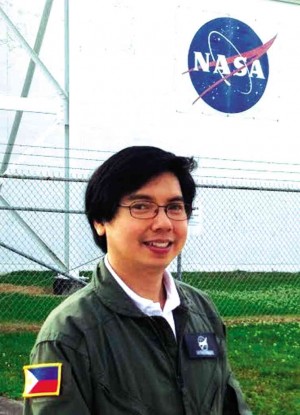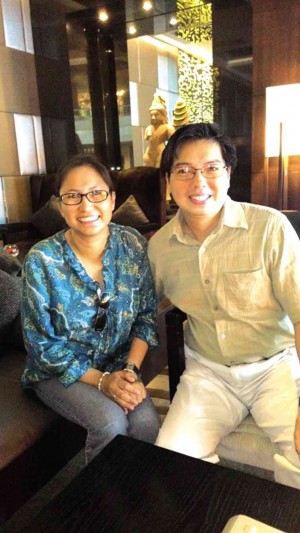Pinoy scientist who brings food in space
BANGKOK, Thailand—Apollo Arquiza is not the usual scientist in a lab coat talking about space and mathematical equations.
Instead, he talks about the looming food shortage in the world especially in disaster-prone areas like the Philippines and how the food technology he helped developed for space missions could also be used on Earth.
He was in Thailand for a week for a study and field visits sponsored by the Thailand Institute of Scientific Technology Research under the Ministry of Science and Technology.
Balik Scientist Program
After staying in the United States since 2005 for his PhD in Biological and Environmental Engineering and Advance Life Support at Cornell University, Arquiza, also a research assistant and lecturer, is in the Philippines under the Balik Scientist Program of the Department of Science and Technology (DOST).
During the 90-day program, Arquiza collaborated with the Food and Nutrition Research Institute (FNRI) and DOST regarding the food processing technology.
“During the harvest season, vegetables and fruits in the Philippines can be brought at lower prices. The idea is for the local government to buy these products directly from the farmers who, in turn, will be processed and used as ‘food for calamity,’” Arquiza explains.
DOST and FNRI arranged Arquiza’s visits to calamity-hit areas in the Philippines like Tacloban City and Cagayan de Oro.
“The usual food pack distributed during calamity includes sardines, noodles and rice. But these are not really nutritious. So we need to develop shelf-stable foods like dried vegetables like squash and fruits,” he says.
Arquiza explains that the Philippines has local technology in food preservation but the latest technology he learned on space food preparation is also needed to enhance it.
Cornell to Nasa
When his wife, Amihan, was awarded with a Fulbright scholarship for PhD at Cornell University in 2005, Arquiza resigned from his teaching job at the University of the Philippines Los Baños (UPLB).
At Cornell, he applied for PhD and got accepted because of his excellent researches and stellar academic records in the Philippines.
Since 2007, he has been working with Dr. Jean Hunter in the latter’s Nasa-funded projects which include the HI-SEAS (Hawaii Space Exploration Analog and Simulation) program.
In 2012, he completed his postdoctorate in Outer Space also at Cornell.
Arquiza started his research on advanced life support for human space exploration. His work is a part of Hunter’s research on space food studies funded by Nasa (National Aeronautics and Space Administration). It is a part of the HI-SEAS, a mock Mars simulation environment.
Nasa does not question his race or nationality. In the scientific community, everybody is important and their contributions to the advancement of science is all that matters, he says.
However, since he is the only Filipino among the group, he was escorted by a security personnel when the team boarded a zero-gravity G-Force 1 space simulator plane in late April last year to test the effectiveness of a specially constructed space galley.
“I don’t think that was discrimination. The area is owned by the government and the project is strictly military in nature. So it was really for security reasons,” Arquiza explains.
The food study (HI-SEAS) and design of cooking equipment for the space habitat project ended in 2014. Hunter and Arquiza are currently preparing for a follow-up and other research proposals for Nasa funding.
Travel to Mars
In 2030, the United States government would send at least six astronauts to Mars. The travel to and from the Earth and back is expected to be 16 months.
With the long confined travel, Arquiza explains that humans need to cook not only for nourishment but also for psychological reasons.
They need to interact during cooking and also at meal time. Hence, food with longer shelf life of at least five years is developed to sustain them for a long time. Food supply is also less bulky.
In space, Filipino food is the first thing Arquiza wants to cook.
“Adobo is possible to prepare in a future space habitat, since it can be done with freeze-dried chicken or pork but not the food I miss the most: rellenong bangus!” he says.
Arquiza thinks the Mars One mission is a shady deal, since the organizers don’t have technology at this time and it is only a one-way ticket.
He says that the Mars mission is strictly military and scientific in nature.
But asked if he would travel to Mars with his wife, he says “No” because the astronauts would need his expertise on food to be developed on Earth before it would be sent to Mars.
Study science
Arquiza notices now that the Philippine government is allocating more funds for DOST researches unlike during his 12-year stint as a researcher and lecturer at UPLB.
That time, Arquiza recalls, his researches on bioprocessing and biochemical engineering got little or no funding. He also mentions the establishment of regional science high schools. Although he views the Philippines as a service economy, he believes that science graduates can also work in BPO industries catering to clients inclined to researches and other allied sciences.
Many Filipinos abroad have proven their worth in all fields usually dominated by Westerners. Yet, Arquiza believes that they should not stop there. Working hard to be recognized both for personal gain and for being Filipinos is a must.
For Arquiza, completing his postdoctorate degree is not yet the end but a new beginning to pursue another field of science still being developed at Cornell for future use in Space Exploration: Computational Science and Engineering.


